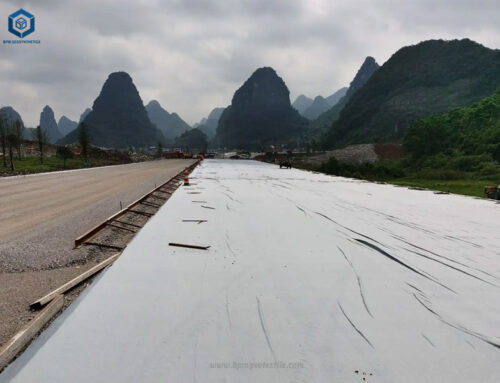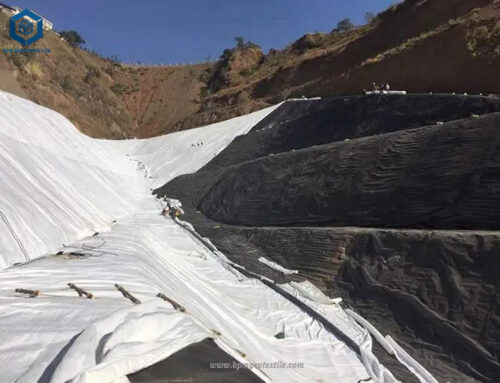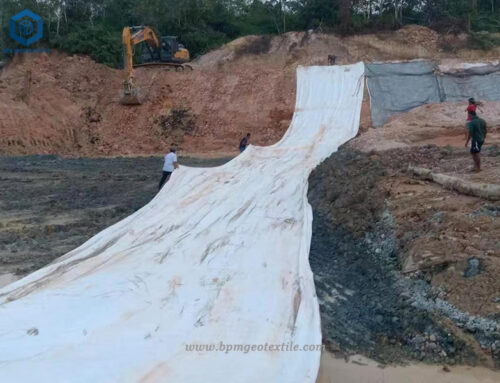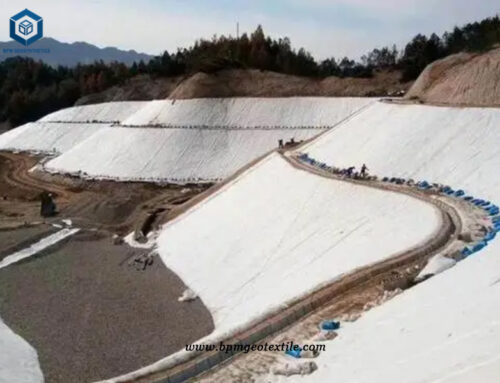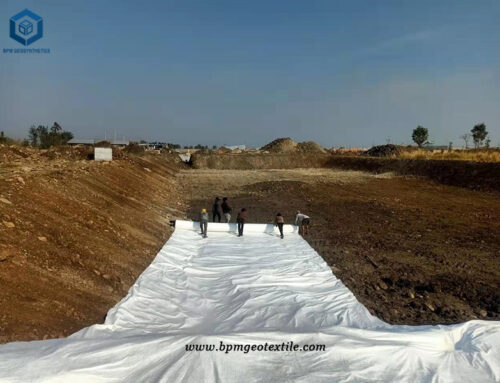Black non woven polypropylene fabric, also known as black nonwoven geotextile, is designed to effectively filter particulates in subsurface drainage. It serves as an ideal solution for drainage applications by filtering out soil fines while maintaining excellent permeability and breathability. This fabric allows water and air to pass through while preventing dirt and debris from obstructing drains and spillways. Its engineered design ensures efficient filtration, making it a reliable choice for drainage systems.
1. What Is Black Non Woven Polypropylene Fabric?
Black non woven polypropylene fabric is composed of 100% virgin staple polypropylene fibers, which are further enhanced by the addition of carbon black. These fibers are intricately tangled and interlocked using a needle-punching technique. This manufacturing process imparts the fabric with a range of beneficial properties, including isolation, filtration, drainage, reinforcement, protection, and maintenance. This process produces a flexible yet solid fabric with a weave-like texture resembling canvas. Black nonwoven polypropylene fabric serves as a reliable geotextile fabric for various applications.
Polypropylene non woven geotextile fabric is widely used in areas such as road construction, landfills, canals, and salt ponds. Its ability to perform functions like filtration, drainage, and reinforcement makes it an essential component in these projects. The fabric effectively separates different materials, filters out particulates, promotes water drainage, provides structural reinforcement, and safeguards against erosion and damage.
Black non-woven polypropylene fabric is a high-quality material that offers excellent performance and versatility in geotechnical and civil engineering applications.
2. What Are Features of Black Non Woven Polypropylene Fabric?
Black non-woven polypropylene fabric offers a combination of permeability, filtration, protection, and reinforcement properties that make it a valuable material for a wide range of geotechnical and civil engineering applications.
2.1 Excellent permeability and filtration
The black non woven polypropylene fabric allows for the passage of water and air while effectively filtering out soil fines and particulates. This helps to prevent clogging of drains and spillways.
2.2 Soil protection and isolation
Black non woven polypropylene fabric acts as a protective layer, preventing direct contact between different soil layers and minimizing the risk of contamination or mixing. The fabric helps maintain the integrity and stability of the soil structure.
2.3 Drainage and filtration
The Black nonwoven polypropylene fabric enables efficient water drainage, allowing excess water to flow through while retaining soil particles. This helps in preventing waterlogging and maintaining optimal soil moisture levels.
2.4 Cost-effective and easy to use
Black non-woven polypropylene fabric is relatively affordable compared to other geotextile materials. Its simple construction and ease of use make it a practical choice for various applications.
2.5 Reinforcement in retaining wall backfill
The black non woven fabric provides additional strength and stability to retaining walls by reinforcing the backfill material. This helps to resist soil pressure and prevents wall failure.
2.6 Slope stability and erosion control
By improving the stability of slopes, the fabric reduces the risk of soil erosion caused by water flow or other environmental factors. It helps to maintain the integrity of the slope and prevents soil loss or damage.
2.7 Protection against freezing
The non woven polypropylene fabric helps to protect the soil from freezing and its associated damage, preserving the structural integrity and preventing potential hazards.
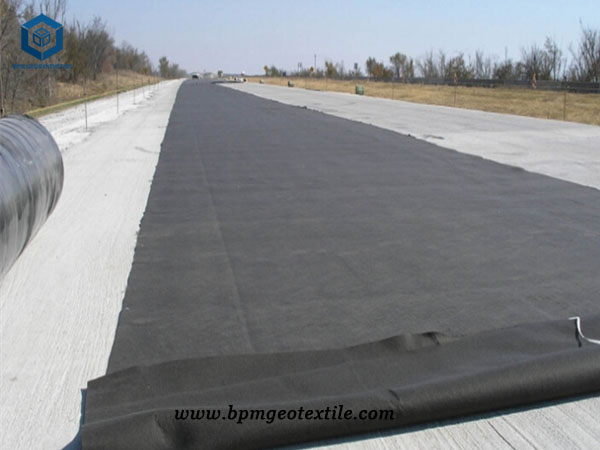
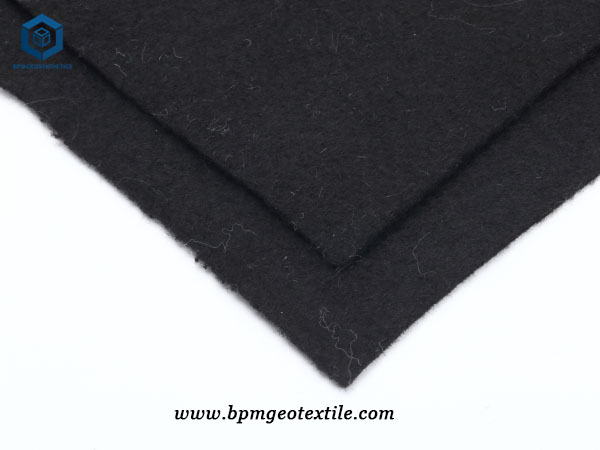
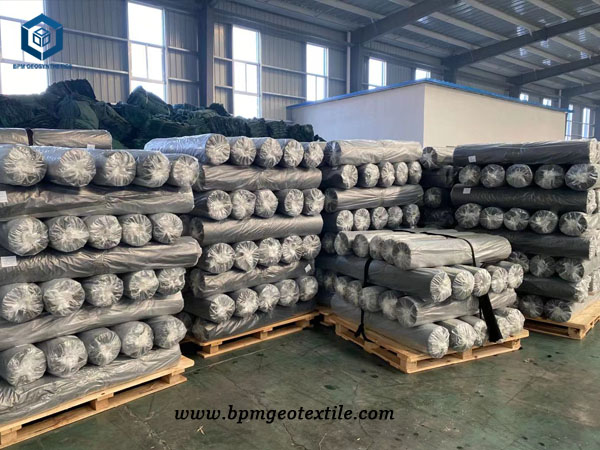
3. Case Study of Black Non Woven Polypropylene Fabric Thailand for Road Construction
A customer from Thailand approached BPM Geotextile seeking a high tensile strength geotextile fabric for road construction. After receiving four different geotextile technical data sheets (TDS) from us, the client carefully compared the specifications and chose the 350g black color geotextile polypropylene fabric. They requested a sample for further evaluation.
We promptly prepared a 2 square meter sample of the selected geotextile and provided a comprehensive testing report. Upon receiving the sample, the customer conducted extensive tests and determined that the geotextile would require the addition of 3% UV stabilizers to enhance its service life.
The customer expressed great satisfaction with our initial collaboration and the high quality of the geotextile fabric we provided. The final order placed by the customer amounted to 720,000 square meters of geotextile fabric. Specifically, the fabric had a specification of 350 gsm (grams per square meter) and came in rolls measuring 2m by 50m.
This case study highlights how our black non-woven polypropylene fabric successfully met the customer’s requirements for road construction in Thailand. We demonstrated our commitment to delivering superior products and accommodating their specific needs, resulting in a mutually beneficial partnership.
4. About BPM Geotextile
BPM has been manufacturing and supplying many types of effective and states of the art geotextile to over 81 countries. BPM geotextile products include filament non woven geotextile, short fiber needle punched geotextile fabric, polypropylene woven geotextile and pet woven geotextile fabric, etc. BPM geotextiles are widely used for erosion control, stabilization, filtration, separation, construction underlayment, general landscaping, and more.
Any questions, please contact us.

